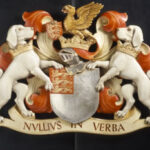Roger Pielke jr vermeldt op zijn blog een interessante uitwisseling van ideeën tussen Mickey Glantz en Tom Chase, beiden net als Pielke zelf verbonden aan de University of Colorado in Boulder. Ik interviewde beiden toen ik afgelopen augustus in Boulder was om interviews te doen voor mijn boek. Glantz is een social scientist die jarenlang bij NCAR in Boulder werkte, alias de global warming castle, zowel vanwege de prachtige ligging op een heuvel boven Boulder als vanwege de vele IPCC-auteurs die er werkzaam zijn (Trenberth en Wigley werken er bijvoorbeeld).
Pielke jr werkte jarenlang eveneens op NCAR in de groep van Glantz. Zij probeerden als sociale wetenschappers de ‘harde’ klimaatonderzoekers van NCAR zo nu en dan te kietelen door sceptici uit te nodigen of door sceptische informatie te presenteren. Die houding kostte Glantz mogelijk de kop want twee jaar geleden werd hij ondanks het feit dat hij tenure had plotseling ontslagen door de nieuwe directeur van NCAR. Pielke jr blogte er destijds over. Er volgde een actie waarbij zelfs Bill Clinton betrokken was en uiteindelijk kreeg Glantz geld en een nieuwe positie aan de University of Colorado zodat hij zijn werk kan voortzetten.
Glantz is geen klimaatscepticus hoewel hij ook geen fan is van het IPCC. Hij vertelde mij dat hij in de beginjaren van het IPCC eens een voordracht bij een IPCC-bijeenkomst had gehouden. Glantz doet onderzoek naar de gevolgen van klimaatverandering, wat valt onder Working Group II. In zijn voordracht vertelde hij dat sommige effecten positief zullen zijn en andere negatief. Na afloop kwam er een IPCC’er naar hem toe en zei hem: ‘Geen positieve effecten, er zijn alleen negatieve effecten.’ Het voorval was voor Glantz voldoende om zelf niet actief bij IPCC betrokken te zijn. Hij accepteert – net als Pielke jr – wel de meeste bevindingen van WG I van het IPCC.
Oproep
Glantz doet nu een oproep aan de klimaatsceptici om hun e-mail correspondentie van de afgelopen jaren vrijwillig vrij te geven zodat we kunnen zien of de sceptici ‘bovenmenselijk’ zijn in hun correspondenties of dat ze net zo menselijk zijn als de climategate-betrokkenen. Glantz deed de oproep op zijn blog en in een lokale krant:
Let`s be honest. We have all said things on e-mail ranging from serious to silly to stupid. We have all sent curt responses based on the fact that those receiving it understand the context of the abbreviated message. I am not condoning or excusing the sometimes dumb, sometimes uncaring and sometimes deceptive comments that have appeared in the so-called “Climategate” so-called “scandal.” That situation will be sorted out by others, most likely investigative committees. Yes, the e-mails were illegally hacked. Nevertheless, they are now public. So, the public will read them and they have through the media. E-mailing has its consequences.
There is no question in my mind that the integrity of both the scientists and of e-mail security has been damaged. Others will assess that level of impact. But here I want to call for a level playing field. It`s a good faith challenge to the climate skeptics who are using “climategate” (also called “emailgate”) to discredit the science of climate change, though they cannot discredit the impacts of a changing climate on people today and in the future.
I call upon the climate change skeptics —- political, scientific and media —-to share with the world a block of their unbroken, years-long chain of e-mails about climate change. I am asking them to do this on a voluntary basis in order to show us that they are super human and do not share the human frailty of “loose lips” that the rest of humankind is subject to.
Doing so would provide outsiders an even broader context in which they can evaluate the content of the e-mails that had been hacked and released from the Climate Research Unit (CRU) at the University of East Anglia (involving scientists at Penn State and at NCAR). Let society be the judge about the words and motives of all involved in the climate change issue at the political, scientific and media levels, and let society be the judge on the merits of the finding and interpretation of the science of climate change.
After all, isn`t turn about fair play? Or what is good for the goose should be good for the gander as well, no?
Gedachtenexperiment
Glantz’s ballonnetje is een grappig gedachtenexperiment maar niet erg realistisch natuurlijk. Zelfs als een scepticus al zijn correspondentie zou willen vrijgeven, dan nog is het de vraag of hij niet enkele inconvenient e-mails heeft weggelaten. Het zal uiteindelijk dus niks oplossen. Tom Chase, die niet zo bekend is in het publieke debat, maar die, zo bleek ook tijdens mijn gesprek met hem uitgesproken sceptisch is, met name over de kwaliteit van klimaatmodellen, gaf de volgende reactie:
Michael Glantz offers an interesting challenge to climate scientists whose opinions differ from the party line (“Skeptics, show us your e-mails”). I am one of those scientists. This is, however, an impractical challenge because there is no way to remove all personal information involving one’s self and countless others.
However, because I teach and do climate research at the University of Colorado, I do assume all my e-mails are the property of the Colorado State Government and if necessary could be examined in depth by the appropriate officials. I am confident that there would be no e-mails, even if “taken out of context,” which would indicate (as the Climatic Research Unit e-mails do) that I was trying to rig the peer review process or trying to keep contrary information out of international summary documents. But these are relatively minor issues.
The real challenge to all scientists is to actively challenge the validity of their conclusions by seeking and supporting independent reproduction of their results. This is the foundation of science: intellectual self-criticism. The single biggest scandal revealed in the emails from the Climatic Research Unit is the lengths they went to refuse outside requests to make data and methodology available over the course of years including discussions about resisting Freedom of Information Act requests. Something like this would never show up in my e-mails. I have always enthusiastically aided anyone trying to reproduce or refute my results.
That the work produced by the Climatic Research Unit is not completely and independently reproducible because the data and methods were actively hidden from public scrutiny indicates that whatever was occurring over time at the Climatic Research Unit, it was never related to science.
Chase komt met een interessantere suggestie. Zijn e-mails zijn waarschijnlijk eigendom van zijn werkgever en derhalve beschikbaar voor inspectie. Hij is duidelijk niet bang voor zo’n inspectie. Ik denk dat de meeste sceptici helemaal niet tegen zo’n actie zouden zijn, mits de inspectie niet alleen zou gelden voor aan x aantal bekende klimaatsceptici maar bijvoorbeeld ook voor alle lead authors van IPCC-rapporten. Ik denk dat zo’n operatie – hoewel daar heel wat manjaren werk in zit – heel veel duidelijk zou maken over de werkelijke staat van het klimaat en het klimaatonderzoek.
Open en transparant
Er zijn al diverse pogingen gedaan door McIntyre en onder andere David Holland om e-mail correspondentie tussen IPCC-auteurs vrij te krijgen, bijvoorbeeld tussen Caspar Ammann en Keith Briffa. Ammann zond commentaar naar Briffa dat vervolgens werd opgenomen in het vierde IPCC-rapport. Hij deed dat echter buiten de ‘open en transparante’ review procedure van het IPCC om. McIntyre:
For some reason, Ammann seems to think that he is not subject to IPCC requirements that expert comments be open and that he is entitled to make secret comments.
Dus ik denk dat het idee van Glantz gretig gehoor zal vinden bij McIntyre en anderen mits ook alle correspondentie tussen lead authors van het vierde IPCC-rapport vrij zal worden gegeven. Ik denk overigens dat in de correspondentie van McIntyre zelf weinig tot geen explosief materiaal gevonden zal worden. Hij zal vast wel eens gevloekt hebben in een e-mail naar coauteur McKitrick uit frustratie over bijvoorbeeld weer een afwijzing van een ingediende publicatie. Maar verder heb ik McIntyre noch op zijn blog noch in mijn eigen correspondentie met hem ooit op iets lelijks kunnen betrappen.
[Toevoeging] In een van de reacties bij Pielke schrijft Dan het volgende:
A panel discussion at MIT touched on this issue: http://mitworld.mit.edu/video/730. Lindzen suggested that it would be an interesting project to study the EAnglia emails and was later challenged by an audience member to release his own emails to be dissected. Kerry Emanuel also hoped that sceptic emails could be reviewed, implying that the CRU emails would not be so far out of the ordinary. Lindzen, like Chase, replied that none of his emails would reveal similar problems.







Climategate en het rumour er omheen kan afleiden van de centrale kwestie die hier ook nog eens door Chase wordt genoemd: "The real challenge to all scientists is to actively challenge the validity of their conclusions by seeking and supporting independent reproduction of their results. This is the foundation of science: intellectual self-criticism."
Met oproepen om alle e-mails openbaar te maken, bestaat het risicio dat de belangrijkste conclusie uit Climategate ondersneeuwt. Namelijk dat er hele grote aanwijzingen zijn dat enkele vooraanstaande klimaatwetenschappers gepoogd hebben de basis van wetenschap, namelijk het reproduceren van onderzoeksresultaten, tegen te werken door het zeer selectief vrijgeven van onderzoeksgegevens en methodologie. Die boodschap kan niet vaak genoeg herhaalt worden.
Als daarnaast ook nog blijkt dat deze klimatologen gepoogd hebben wetenschappelijke tijdschriften en het peer review proces te beïnvloeden, dient elke klimatologisch instituut zelfonderzoek te plegen. Het gaat namelijk niet meer alleen over klimatologie, maar over de betrouwbaarheid van natuurwetenschap in het algemeen.
Fred, je hebt helemaaaaaaaaal gelijk.